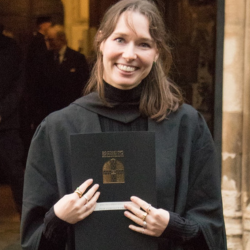
Submitted by acs95 on Tue, 18/03/2025 - 15:26
Name: Franziska Katharina Bünz
Research group: Old Age Psychiatry
Supervisor: Dr Maria-Eleni Dounavi
Advisor: Professor John T. O’Brien
Title of your PhD/MPhil: Investigation of deep medullary vein alterations and their association with cerebral small vessel disease and cognition in the dementia trajectory
Can you give us a short background into what your PhD/MPhil was about?
My research focussed on understanding how deep medullary veins (DMVs), a type of venous structure in the brain, may be involved in the early vascular changes linked to dementia. While the role of arterial processes in dementia is well-documented, the venous side is comparatively understudied. Using data from the PREVENT-Dementia study, I investigated whether alterations in DMV visibility—an indicator of vascular health—are associated with known dementia risk factors, cerebral small vessel disease (CSVD), and cognitive performance in middle-aged individuals, a stage considered critical for identifying early dementia-related changes.
How would you sum up your main findings?
I found that DMV alterations, as measured by a visual rating scale, were not significantly associated with most dementia risk factors, CSVD markers, or cognitive performance in midlife. Interestingly, DMV ratings slightly decreased over time, and individuals with more years of education showed a minor but significant decrease in DMV visibility. These findings suggest that the visual rating scale might not capture existing associations with these factors, or these factors are not associated and are rooted in diverging pathophysiological processes.
What made you want to do a PhD?
As a medical student, I am drawn to the research side of medicine and how it intersects with clinical practice. I’m fascinated by the process of how we build our knowledge about diseases and treatments, how we critically evaluate it, and how research can drive improvements in patient care. My interest in dementia research grew from this curiosity, particularly because dementia poses such complex and pressing challenges for healthcare.
What was your best day during your PhD?
As cliché as it sounds – it was the day of my viva. As my supervisor had prepared me, it is quite special to get to talk to two experts in the field, present the work that one has done for the past year, and listen to advice, suggestions, feedback and (if lucky) encouragement about the work.
What was your worst day during your PhD?
Probably the day my feedback came back from my first-ever draft. It was a long road from my first draft to the final draft. In the end I am grateful for the honest and detailed feedback, I learned a lot from it, and I believe it made my thesis so much better, but it wasn’t always easy.
Do you have any words of advice to future PhD/MPhil students in Psychiatry?
Make the most of everything Cambridge has to offer—not just the incredible resources for your research, but also the talks, sports clubs, and societies. Take the chance to explore topics and activities you know nothing about—you never know what might inspire you. And as my supervisor always told me: take the weekend off!!!
What do you hope to do next? I hope to finish my final year of medical studies (which is the equivalent to an F1 in Germany), and then I hope to return to Cambridge for my doctoral dissertation next year.

